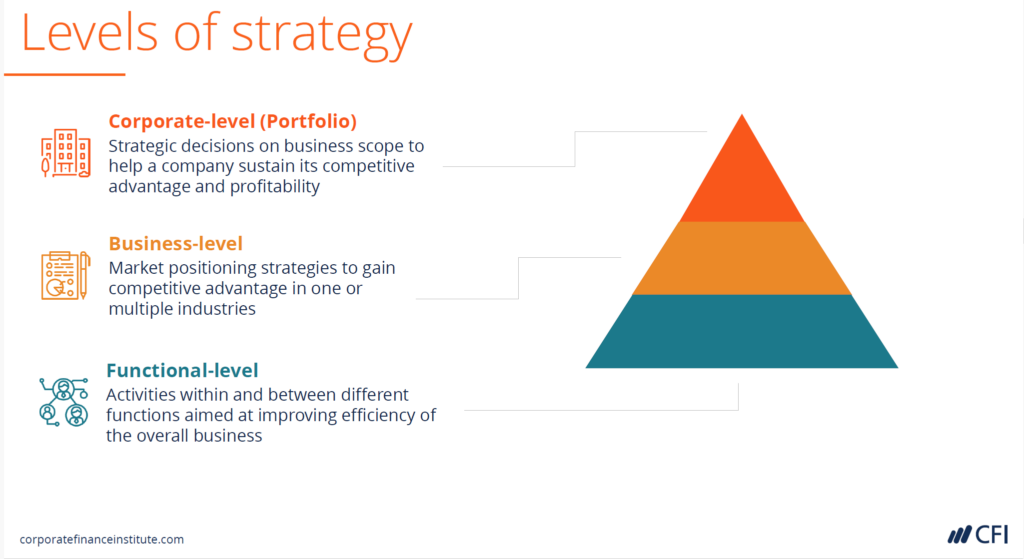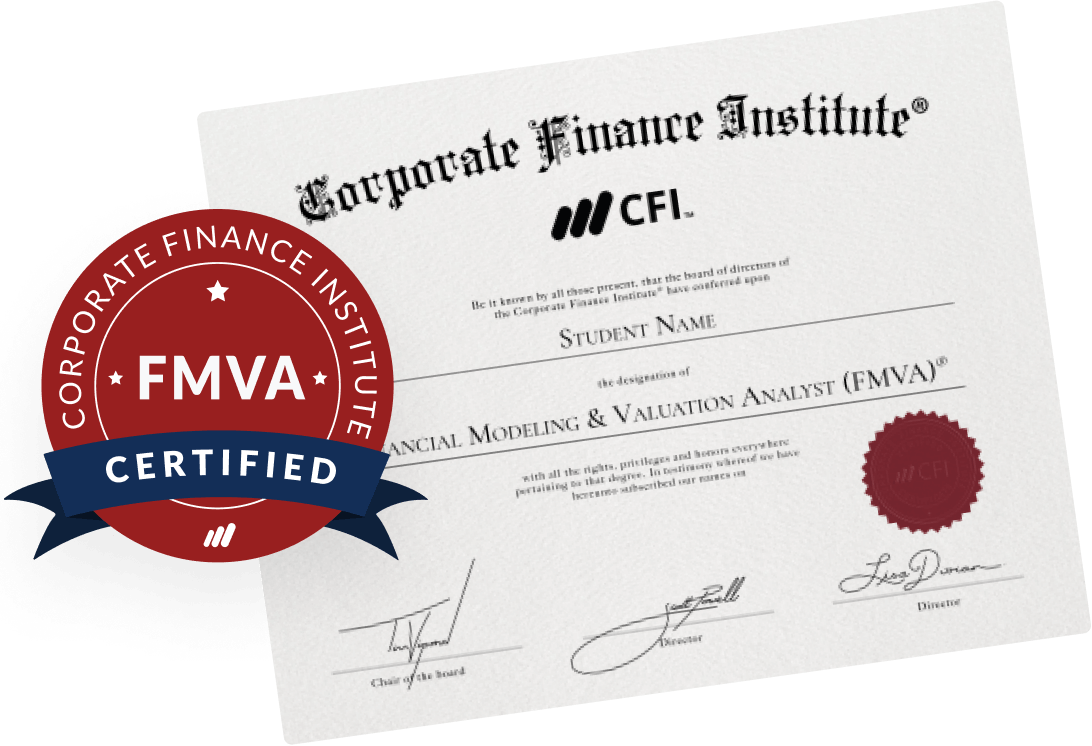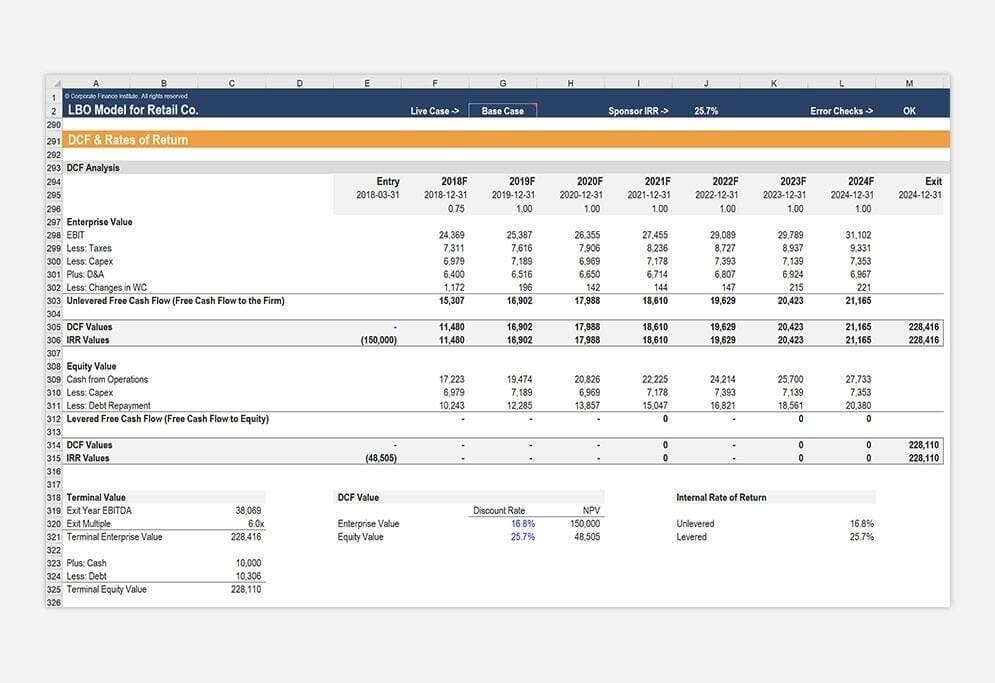
- What Do Corporate Strategy Jobs Entail?
- Different Types of Corporate Strategy Roles for Finance Professionals
- The Importance of Corporate Strategy in a Business's Success
- Providing a Clear Roadmap for the Future
- Adapting to Change
- Optimizing Resource Allocation
- Fostering Innovation
- Enhancing Decision Making
- Key Functions and Objectives of Corporate Strategy Professionals
- Corporate Strategy Jobs vs Corporate Finance Jobs
- Essential Skills for Corporate Strategy Jobs
- Educational and Professional Qualifications for Corporate Strategy
- The Benefits of a Career in Corporate Strategy
- Considering a Career in Corporate Strategy?

Corporate strategy jobs focus on creating and executing long-term plans to achieve a company’s objectives by analyzing areas of finance, productivity, and industry trends. Professionals in these roles work at the highest levels of an organization, collaborating with senior leadership to guide decision-making, optimize resource allocation, and maintain the company’s competitive position in the market.
A corporate strategist’s role can vary, often making it difficult to put into simple terms. Below, we’ll uncover everything you want to know about what corporate strategy jobs entail, the essential skills needed to execute the role, the benefits of this type of career, and more.
What Do Corporate Strategy Jobs Entail?
Corporate strategy jobs focus on aligning a company’s various business units and resources to achieve overarching goals. These roles require analytical skills, business acumen, and strategic thinking to shape an organization’s future direction.
Corporate strategy is also often referred to as internal strategy, which shares similarities to management consulting. However, the key distinction lies in its focus. While management consulting usually involves working with multiple clients across various industries, corporate strategy revolves around addressing the internal needs of a single company, with specific duties and responsibilities such as the following:
- Developing and implementing long-term strategic plans
- Identifying growth opportunities and assessing market trends
- Analyzing competitor activities and industry dynamics
- Recommending strategic initiatives to senior leadership
- Aligning business units and resources with overarching goals
- Evaluating potential mergers, acquisitions, and partnerships
- Conducting financial modeling and creating business cases
- Preparing and delivering presentations to stakeholders
- Performing in-depth research and data analysis
- Participating in strategic meetings and decision-making processes
Different Types of Corporate Strategy Roles for Finance Professionals
Corporate strategy offers various career paths for finance professionals, each with its own focus and level of responsibility. Some typical roles of a corporate strategist include:
- Strategy Analyst: This entry-level position typically focuses on gathering and analyzing data to support strategic decision-making. Strategy analysts often work on specific projects or initiatives within the broader corporate strategy framework, honing their analytical skills and gaining exposure to high-level strategic planning.
- Corporate Development Manager: The role of a corporate development manager involves identifying and evaluating potential mergers, acquisitions, and partnerships to drive company growth. The position requires a strong understanding of financial modeling and due diligence processes and the ability to assess the strategic fit of potential opportunities.
- Strategic Planning Director: This senior-level position involves overseeing the development and implementation of long-term strategic plans across multiple business units. Strategic planning directors collaborate closely with executives to ensure that strategies align with overall company objectives and are effectively executed across the organization.
The Importance of Corporate Strategy in a Business’s Success
Effective corporate strategy is vital to a company’s long-term success and sustainability. Here are some key reasons why corporate strategy is crucial for businesses:
Providing a Clear Roadmap for the Future
Corporate strategy offers a well-defined path for an organization’s future, helping to align resources and efforts across different departments and business units. This alignment is essential for achieving long-term goals and maintaining a competitive advantage in the market.
Adapting to Change
In today’s fast-paced business environment, companies must be able to adapt quickly to changing market conditions, emerging technologies, and shifting consumer preferences. Corporate strategy helps businesses stay agile and resilient by constantly evaluating and adjusting strategic plans in response to new challenges and opportunities.
Optimizing Resource Allocation
By providing a clear direction and set of priorities, corporate strategy enables more efficient allocation of financial, human, and technological resources across the organization. This optimization ensures that resources are directed towards the most critical initiatives and used most effectively.
Fostering Innovation
A well-crafted corporate strategy can encourage innovation by identifying new market opportunities, emerging technologies, or unmet customer needs. This focus on innovation helps companies stay ahead of the competition and create sustainable long-term value.
Enhancing Decision Making
Corporate strategy provides a framework for evaluating and making strategic decisions. By aligning decisions with overarching goals and objectives, companies can ensure that their actions contribute to long-term success rather than short-term gains.

Key Functions and Objectives of Corporate Strategy Professionals
Corporate strategy professionals are responsible for a range of critical functions that contribute to an organization’s success. Some of the primary objectives and functions include:
- Market analysis: Corporate strategists conduct in-depth research on industry trends, competitor activities, and market opportunities to inform decision-making. This analysis helps identify potential growth areas and threats to the business, allowing the company to position itself effectively in the market.
- Resource allocation: These professionals work to optimize the distribution of human, technological, and financial resources across the organization. Their recommendations ensure that resources are aligned with strategic priorities and used efficiently to support the company’s goals.
- Strategic planning: Corporate strategy teams are responsible for developing comprehensive long-term plans that outline the company’s vision, goals, and key initiatives. These plans serve as a roadmap for the organization, guiding decision-making and resource allocation across all levels of the business.
- Performance monitoring: Corporate strategists often play a role in developing key performance indicators (KPIs) and monitoring the progress of strategic initiatives. This ongoing evaluation helps ensure that the company stays on track to achieve its long-term objectives and allows for timely adjustments when necessary.
- Competitive positioning: By analyzing competitor activities and market dynamics, corporate strategy professionals help companies identify and maintain their competitive advantages. This may involve recommending changes to product offerings, pricing strategies, or target markets to strengthen the company’s position in the industry.
Corporate Strategy Jobs vs Corporate Finance Jobs
While both corporate strategy and corporate finance play crucial roles in an organization’s success, there are several key differences between these two career paths:
Scope of Work
Corporate strategy focuses on long-term planning and overall business direction, taking a holistic view of the organization and its competitive landscape. In corporate finance, the concentration is on managing the company’s financial resources and capital structure, dealing primarily with the monetary aspects of executing the strategic vision.
Decision Making
Corporate strategy involves making decisions about which markets to enter, what products to develop, and how to position the company competitively. Corporate finance, on the other hand, focuses on the decisions most related to funding initiatives. This also includes managing financial risk and optimizing a company’s financial performance and position.
Timeframe
A corporate strategist deals with a longer timeline, typically looking 3-5 years or more into the future of a business. While corporate finance still considers the long-term financial health of a business, when it comes to the timeframe of the scope of work, the primary focus is on short-term financial management and reporting cycle.
Skill-set Requirements
In corporate strategy, the skills required involve market analysis, competitive positioning, and business model innovation. Corporate finance requires expertise in financial modeling, capital markets, and accounting principles.
Key Metrics
Corporate strategy typically focuses on metrics such as market share, customer satisfaction, and long-term growth potential. In the corporate finance world, the concentration is on profitability metrics, as well as metrics regarding return on investment (ROI) and cash flow.
Essential Skills for Corporate Strategy Jobs
Success in corporate strategy roles requires a diverse set of skills that combine analytical capabilities with strong business acumen and leadership qualities. Some of the most essential skills include:
- Analytical thinking: Corporate strategists must be able to analyze complex data sets, identify patterns, and draw meaningful insights to support strategic decision-making. Strong quantitative and qualitative analytical skills are crucial for success in these roles.
- Strategic thinking: The ability to think critically about long-term implications and develop innovative solutions to complex business challenges is fundamental to corporate strategy roles.
- Communication and leadership: Corporate strategists must be able to articulate complex ideas clearly and persuasively, as they often need to present their findings and recommendations to senior executives and stakeholders. Strong leadership skills are also important for driving strategic initiatives across the organization.
- Business acumen: A deep understanding of business principles, industry dynamics, and financial concepts is essential for corporate strategy professionals to make informed recommendations and decisions.
- Adaptability: Given the rapidly changing business environment, corporate strategists must be able to adapt quickly to new information, market conditions, and organizational priorities.
- Collaboration: Corporate strategy roles often involve working with diverse teams across different departments and levels of the organization. Strong collaboration and interpersonal skills are crucial for success in these positions.
- Project management: The ability to manage multiple complex projects simultaneously, often with competing priorities and tight deadlines, is a valuable skill in corporate strategy roles.
Educational and Professional Qualifications for Corporate Strategy
While the specific requirements may vary depending on the organization and level of the position, there are some common educational and professional qualifications sought after in corporate strategy roles:
Educational Background
Most corporate strategy positions require at least a bachelor’s degree in business, finance, economics, or a related field. Many professionals in senior roles hold advanced degrees such as an MBA or specialized master’s in strategy or finance.
Professional Experience
Many corporate strategy roles require several years of experience in related fields such as management consulting, investment banking, or corporate finance. This experience helps professionals develop the analytical skills and business knowledge necessary for success in corporate strategy.
Professional Certifications
While not always required, certifications such as Chartered Financial Analyst (CFA) or Certified Management Consultant (CMC) can enhance a candidate’s credentials and demonstrate expertise in specific areas relevant to corporate strategy. CFI’s Financial Modeling & Valuation Analyst (FMVA®) certification provides holders with important financial analysis skills, with a focus on building effective financial models for informed business and corporate strategy decisions.
Industry Knowledge
Depending on the company and industry, specific sector expertise may be highly valued in corporate strategy roles. This knowledge can be gained through work experience, specialized coursework, or industry certifications.

The Benefits of a Career in Corporate Strategy
A career in corporate strategy offers numerous benefits for professionals seeking a challenging and rewarding path in the finance and business world. Some of these benefits include:
- Career growth opportunities: Corporate strategy roles offer excellent opportunities for professional development and advancement. Professionals in these positions often gain exposure to high-level decision-making processes and can progress to senior leadership roles within an organization.
- Intellectual stimulation: Corporate strategy jobs provide a dynamic and challenging work environment, requiring professionals to continually learn and adapt to new business landscapes. This intellectual stimulation can be highly rewarding for those who enjoy solving complex problems and driving organizational change.
- Positive impacts on business success: Corporate strategists have the opportunity to shape a company’s future direction and contribute directly to its long-term success. This level of impact can be highly satisfying for professionals who want to see the tangible results of their work.
- Diverse skill development: Working in corporate strategy allows professionals to develop a wide range of skills, from analytical and financial expertise to leadership and communication abilities. This diverse skill set can be valuable for future career opportunities across various business functions.
- Exposure to senior leadership: Corporate strategy roles often involve working closely with C-suite executives and other senior leaders, providing valuable networking opportunities and insights into high-level decision-making processes.
Considering a Career in Corporate Strategy?
Corporate strategy jobs play an essential role in shaping the future of businesses while offering professionals the opportunity to impact organizational success at the highest level. These types of roles require a unique combination of skills, which makes them both challenging and rewarding for those who are pursuing a career in corporate strategy.
To further develop your skills in corporate strategy and financial analysis, explore CFI’s comprehensive range of courses and resources. Our online courses can help you build the expertise needed to excel in corporate strategy roles and advance your career in finance.
Additional Resources
Business Strategy vs Business Model
Corporate Development Career Profile

Create a free account to unlock this Template
Access and download collection of free Templates to help power your productivity and performance.
Already have an account? Log in
Supercharge your skills with Premium Templates
Take your learning and productivity to the next level with our Premium Templates.
Upgrading to a paid membership gives you access to our extensive collection of plug-and-play Templates designed to power your performance—as well as CFI's full course catalog and accredited Certification Programs.
Already have a Self-Study or Full-Immersion membership? Log in
Access Exclusive Templates
Gain unlimited access to more than 250 productivity Templates, CFI's full course catalog and accredited Certification Programs, hundreds of resources, expert reviews and support, the chance to work with real-world finance and research tools, and more.
Already have a Full-Immersion membership? Log in





